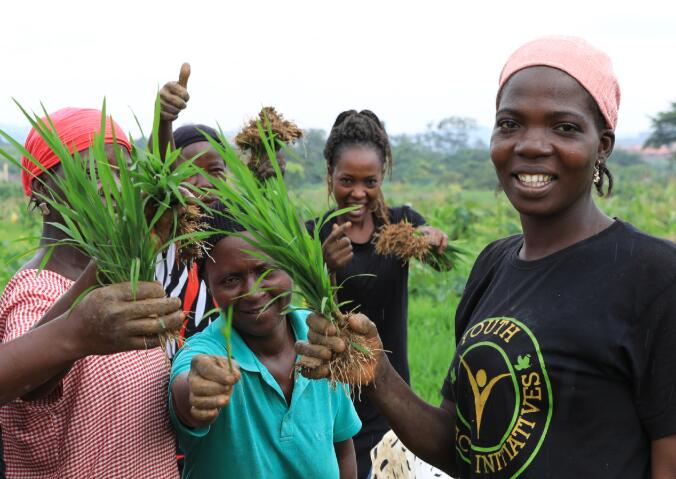
Staff members who work at the Nigerian Agricultural Technology Demonstration Center near Abuja, the capital of the West African country show rice seedlings to the camera, Sep 19, 2023. [Photo/Xinhua]
At the Nigerian Agricultural Technology Demonstration Center near Abuja, capital of the West African country, Chinese agricultural experts have a daily routine of examining newly harvested rice.
As a result of years of dedicated work, experts from Chinese company Green Agriculture West Africa Ltd have developed a high-yield rice seed tailored to local conditions, which outperforms native varieties by over 20 percent. The seeds, endorsed by Nigerian agricultural authorities, are now planted across two-thirds of the country's states.
Transferring techniques
Over the past decade, the Nigerian Agricultural Technology Demonstration Center has stood out among the 24 centers established by China across Africa. These centers are pivotal in advancing agricultural technology, successfully transferring over 300 sophisticated agricultural techniques to local farmers.
The effect of these initiatives is substantial, boosting crop yields by 30 percent and positively affecting over 1 million small-scale farmers throughout Africa.
With concerted efforts, Chinese agricultural specialists have remarkably improved the yield and quality of staple crops such as rice, cassava and soybeans. Moreover, they have introduced an array of new fruit, vegetable, and bean varieties. These contributions have not only enriched the diversity of African diets, but also forged fresh pathways for the region's agricultural progress.
In Kigali, Rwanda, Leonidas Mushimiyimana operates the region's largest mushroom cultivation workshop, producing up to 30,000 mushroom tubes monthly and 600 kilograms of fresh mushrooms weekly.
Juncao is a hybrid grass and an important multifunctional agricultural resource developed and used for mushroom farming in China.
After learning the Juncao cultivation technology, Mushimiyimana established the workshop, employing dozens of people. He plans to expand his business to produce dried mushroom products for international markets, fostering communal prosperity.
Juncao technology now benefits over 4,000 Rwandan farmers, creating more than 30,000 jobs along the agricultural value chain.
'Green channel'
Early in the day, freshly harvested rose petals still adorned with dewdrops can be seen at Kenya's Tambuzi Ltd. Within 48 hours, these flowers will reach the shelves of the Hunan Gaoqiao Grand Market in Changsha, China, ready for purchase by Chinese customers.
Kenya, a major global exporter of fresh flowers, used to face challenges in accessing new markets due to high tariffs and complex regulations.
However, China's "green channel "for African agricultural products has expedited inspection and quarantine processes and expanded tariff exemptions, benefiting Kenya's flower industry and other African agricultural products like avocados, citrus, pineapples and coffee.
Huang Zinan, chairwoman of Hunan Xiyue Culture Media Co Ltd, said her company, which cooperates with seven Kenyan flower farms including Tambuzi, sells 100,000 flowers monthly across 14 Chinese cities and exports to Russia and Australia.
Huang noted the significant demand for high-end and rare flower varieties in the Chinese market. She envisioned developing derivative products such as essence oils and floral water to enhance the market competitiveness of Kenyan flowers, boosting local employment and increasing the incomes of flower growers.
As of June 2023, 16 agricultural products from 11 African countries had accessed China through the "green channel", with more African specialty commodities entering the Chinese market.